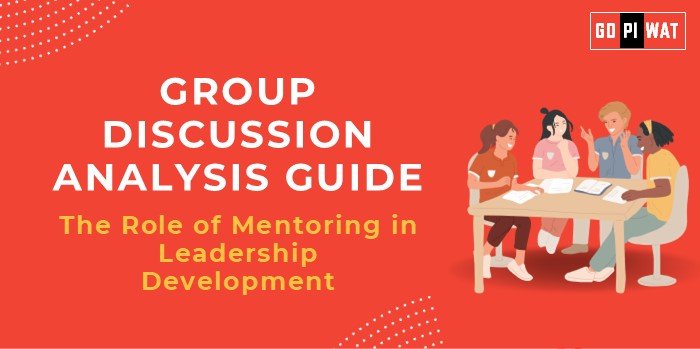📋 Group Discussion (GD) Analysis Guide: The Role of Mentoring in Leadership Development
🌐 Introduction to Mentoring in Leadership Development
- Opening Context: Mentoring has emerged as a cornerstone in leadership development across industries, enhancing skills, fostering strategic thinking, and promoting organizational growth. For aspiring business leaders, understanding the dynamics of mentoring offers valuable insights into management and professional growth.
- Topic Background: The concept of mentoring has historical roots in the master-apprentice model but has evolved to address modern organizational complexities. Current studies emphasize mentoring’s critical role in addressing skill gaps, enhancing career progression, and cultivating future leaders.
📊 Quick Facts and Key Statistics
- 🏢 Mentoring Programs in Organizations: 71% of Fortune 500 companies offer formal mentoring programs, underscoring their strategic importance.
- 📈 Impact on Leadership Growth: Employees with mentors are 5x more likely to be promoted than those without.
- 💼 Retention Rates: Companies with mentoring programs report 38% higher employee retention.
- 💡 ROI on Mentorship: 77% of businesses report improved performance from mentoring initiatives.
👥 Stakeholders and Their Roles
- 🏢 Organizations: Establish mentoring frameworks to nurture talent pipelines.
- 💼 Leaders and Executives: Act as mentors, sharing expertise and fostering growth.
- 📋 Employees: Engage in mentoring relationships to accelerate their professional development.
- 🎓 Educational Institutions: Facilitate mentoring initiatives for emerging leaders in management programs.
🏆 Achievements and Challenges
✨ Achievements
- Enhanced Leadership Skills: Mentoring builds critical skills like communication, problem-solving, and decision-making.
- Diversity Promotion: Programs improve inclusivity by empowering underrepresented groups.
- Knowledge Transfer: Encourages cross-generational learning, ensuring continuity in leadership.
⚠️ Challenges
- Scalability Issues: Effective mentoring is resource-intensive, making it harder to scale across large organizations.
- Mismatch of Goals: Misaligned objectives between mentor and mentee can hinder progress.
🌍 Global Comparisons
- Google’s Mentorship Model: Its peer mentoring approach fosters innovation.
- Finland: National mentoring programs integrate leadership into education systems.
📋 Case Studies
- GE’s Leadership Development Programs: Focus on mentoring as a strategic growth enabler.
💡 Structured Arguments for Discussion
- Supporting Stance: “Mentoring is the most effective way to groom future leaders, ensuring alignment between organizational goals and individual aspirations.”
- Opposing Stance: “Without proper implementation, mentoring can result in dependency and hinder independent decision-making.”
- Balanced Perspective: “While mentoring fosters leadership potential, its success depends on structure, mentor-mentee compatibility, and organizational commitment.”
🔍 Effective Discussion Approaches
🌟 Opening Approaches
- “Organizations investing in mentoring programs see tangible results, from leadership development to employee retention.”
- “The dichotomy of effective mentorship: A personal commitment with measurable organizational benefits.”
💬 Counter-Argument Handling
- Acknowledge limitations like time constraints but propose solutions such as group mentoring models.
📈 Strategic Analysis of Strengths and Weaknesses
- Strengths: Promotes leadership diversity, enhances skill development.
- Weaknesses: Limited scalability, dependency risks.
- Opportunities: Leverage technology for remote mentoring.
- Threats: Resistance to change and potential mismatch of goals.
📘 Connecting with B-School Applications
- Real-World Applications: Analyze the role of mentoring in team dynamics and leadership styles.
- Sample Interview Questions:
- “How can mentoring shape leadership during organizational transitions?”
- “Evaluate the role of mentoring in achieving diversity goals.”
- Insights for B-School Students:
- Leverage mentoring in projects to understand team leadership.
- Study successful mentoring frameworks for practical application.


